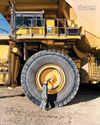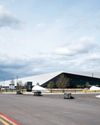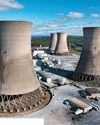
SIX YEARS AGO, in the heat of the deadliest assault on U.S. law enforcement since the Sept. 11 terror attacks, Dallas police chief David Brown made an unprecedented decision.
With a man believed to have shot and killed five officers holed up in a parking garage, threatening to continue his rampage, Brown directed his squad to retrieve the department's Remotec Andros Mark V-A1 bomb disposal robot. He then ordered officers to affix a brick of plastic C-4 to the robot, send it near the suspect, and detonate the explosive. The officers did as told, and the blast killed the 25-year-old assailant, former Army reservist Micah Johnson.
The 2016 incident in Dallas was, and remains, the only known case of U.S. local law enforcement using an officer-controlled robot to end a suspect's life. In the years since, innovation and shifting mores have revived the debate over police using weaponized robots, highlighted by recent showdowns in San Francisco and nearby Oakland.
Amid heightened fears of mass shootings, a smattering of police departments are increasingly looking to weaponized robots as a last resort for subduing suspects and keeping officers out of harm's way. But some civil liberties and criminal justice advocates warn about the potential for law enforcement to misuse and abuse another deadly tool in their arsenal, during a national reckoning on police brutality.
The controversy over robots adds to the long-running nationwide fight over public safety, trust in police, and the militarization of American law enforcement.
"It definitely marks a new level of possible violence meted out by law enforcement, so it's incredibly important that we have this conversation," says Beryl Lipton, an investigative researcher for the Electronic Frontier Foundation, a nonprofit focused on defending civil rights in the digital age.
この記事は Fortune US の February - March 2023 版に掲載されています。
7 日間の Magzter GOLD 無料トライアルを開始して、何千もの厳選されたプレミアム ストーリー、9,000 以上の雑誌や新聞にアクセスしてください。
すでに購読者です ? サインイン
この記事は Fortune US の February - March 2023 版に掲載されています。
7 日間の Magzter GOLD 無料トライアルを開始して、何千もの厳選されたプレミアム ストーリー、9,000 以上の雑誌や新聞にアクセスしてください。
すでに購読者です? サインイン

THE NEW GOLD RUSH
Gold prices have soared amid global uncertainty and a central-bank-driven buying spree. But this time, the gold mining industry looks very different.

A New Season for Giving
As the PGA TOUR kicks off its 2025 season alongside its sponsors in Hawai'i, the organization is continuing to make an impact in local communities.

WELCOME TO ELONTOWN, USA
The small town of Bastrop, Texas (pop. 12,000), has become a home base for Elon Musk's business empire. What comes next is anyone's guess.

100 MOST POWERFUL PEOPLE
Our inaugural, authoritative ranking of the leaders whose innovation and impact have elevated them to the top of the business world.

ARE CEO SABBATICALS THE ULTIMATE POWER MOVE?
WHEN VENTURE capitalist Jeremy Liew and his wife were dating, they talked about how one day they would take a year to travel the world. \"That's how we'd know we'd made it,\" Liew says.

WHAT ARE THE BEST METRICS FOR MEASURING A STARTUP'S POTENTIAL?
IN HIS 2012 ESSAY \"Startup = Growth,\" Paul Graham talks about a 5% to 7% weekly growth rate as table stakes for startup success. If you're growing 10%, he says, you're doing \"exceptionally well.\"

TECH POLYMARKET'S ELECTION ACCURACY MADE SHAYNE COPLAN A STAR-BUT AN FBI RAID POINTS TO TROUBLE AHEAD
IN NOVEMBER, Shayne Coplan had a week he'll remember for the rest of his life: He got a phone call from the highest echelons at Mar-a-Lago. He went on TV for the first time. And his New York City apartment was raided by the FBI.

WHY BIG TECH IS THE NUCLEAR INDUSTRY'S NEW BEST FRIEND
OVER THE PAST several years, Big Tech firms like Google and Microsoft have trumpeted ambitious plans to go carbon-neutral, or even carbon-negative, by 2030. But then the generative-AI boom came along and threw a giant wrench in their plans.

WHAT PALMER LUCKEY, THE MAN REVOLUTIONIZING WARFARE, IS AFRAID OF
PALMER LUCKEY, the founder of the $14 billion Al-powered weapons startup Anduril, has become the face of change in the defense industry.

GLOBAL BUSINESS BRACES FOR TRUMP 2.0
AROUND THE WORLD in 2024, voters chose change: in South Africa, France, Britain, and Japan. But nowhere does the anti-incumbent trend matter more than in the United States.